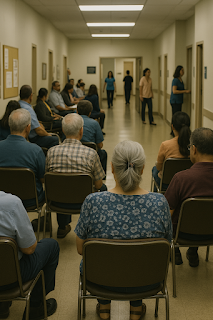For countless individuals relying on government-run clinics for medical care, a visit that should offer relief often becomes a test of patience, endurance, and emotional strain.
These clinics, meant to be sanctuaries of healing and support for the public, especially the underprivileged, have instead become places of silent suffering, marked by disorganization, indifference, and deeply frustrating inefficiency.
Endless Waiting with No Answers
One of the most painful truths about these facilities is the brutally long waiting times.
Patients arrive early in the morning, hoping to be seen within a reasonable time, only to find themselves still sitting, hours later with no indication of when they’ll be called, if at all.
The waiting areas are often packed, stuffy, and filled with the visible exhaustion of people who have nowhere else to turn for help.
There is no effective system in place to communicate estimated waiting times or reasons for delays, leaving patients in the dark, confused, and often anxious.
And even after the exhausting wait to see a doctor, the struggle isn’t over, patients are then forced to wait hours more just to get their prescriptions filled, and sometimes individuals wait long hours for perscriptions just to be told, the medication is not in.
It’s a never-ending cycle of delays, with no urgency or respect for people’s time or well-being.
Staff Inactivity and Indifference
While patients wait endlessly, staff members can frequently be seen walking up and down the corridors, chatting amongst themselves, or idling behind desks without any sense of urgency.
It’s not uncommon to see three or four staff members standing together, doing little, while a waiting room full of sick and elderly people continues to grow more frustrated by the minute.
This lack of attentiveness is not just a matter of poor service, it’s a failure of humanity in spaces where compassion should be central.
No Real Communication Between Patients and Doctors
One of the most troubling issues is the complete communication breakdown.
Patients are often shuffled from one area to another with no clear instructions.
There’s no direct communication between the patient and the doctor until or if they are finally called in.
Important questions go unanswered, updates are nonexistent, and people are frequently left wondering if they’re in the right place at all.
It doesn’t help that staff rarely take the time to provide clear directions.
Many patients, especially the elderly or those unfamiliar with the layout, are told to "go to the doctor" with no clear guidance on which doctor, where that doctor’s room is, or what the proper waiting area is.
You’ll often see confused individuals wandering halls or sitting in the wrong location for hours because they didn’t receive the information they needed.
A System Failing the People
Perhaps the most disheartening aspect is how normalized this chaos has become.
No one seems to question the inefficiency. Staff members do not regularly check in with patients about long delays.
They don’t inform the doctors of those who’ve been waiting for hours.
They don’t apologize or explain, It’s as though the suffering is expected, and accepted.
People deserve more than this, they deserve a system that respects their time, their health, and their dignity.
Government clinics are not inherently broken, but they are being allowed to operate in a broken way.
It’s not just about budgets or understaffing, it’s about accountability, training, and a culture of care that must be reinstated.
A Call for Change
If we are to fix the state of our public healthcare system, we need to start with the truth.
Government clinics are failing too many people, and pretending otherwise only allows the dysfunction to persist.
It's time we demand better, not just in policy, but in practice.
Healthcare is a human right, not a favor, and no one should have to suffer in silence to receive it.

No comments:
Post a Comment